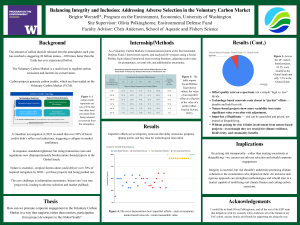Adverse Selection and Equity in the Voluntary Carbon Market: Balancing Integrity and Inclusion in Global Climate Finance.
The Voluntary Carbon Market (VCM) has the potential to mobilize billions in private capital toward global climate goals. Meaningful progress has been made in recent years in strengthening market integrity, with new standards and guardrails put in place to ensure quality. Yet, persistent uncertainty over permanence and project risk continues to contribute to adverse selection, deterring cautious buyers and concentrating investment in a narrow set of project types. In response, integrity initiatives have increasingly emphasized verification and certification requirements. While well-intentioned, this risks over-correction, heightening transaction costs and creating unintended barriers for smaller, nature-based developers, particularly in the Global South. This research asks: How can we stimulate corporate investment in the VCM without making the market too rigid for project developers in the Global South to participate? This topic is informed by interviews with carbon-market professionals that I conducted during my internship as a Voluntary Carbon Market Communications Intern at the Environmental Defense Fund. Recent work has suggested that instead of treating carbon credits as simply “high-quality” or “low-quality,” we should recognize that imperfect projects still deliver real climate value. Building on that idea, this research explores how a Social Welfare Equivalence Framework (SWEF) could be applied in the VCM in practice. Under this approach, credits with lesser permanence or higher risk profiles are still recognized for their contribution, just at an adjusted value that reflects their true climate impact. By grounding credit valuation in an equivalence framework, it addresses adverse selection and strengthens credibility—while supporting diverse, nature-based projects in the Global South.
